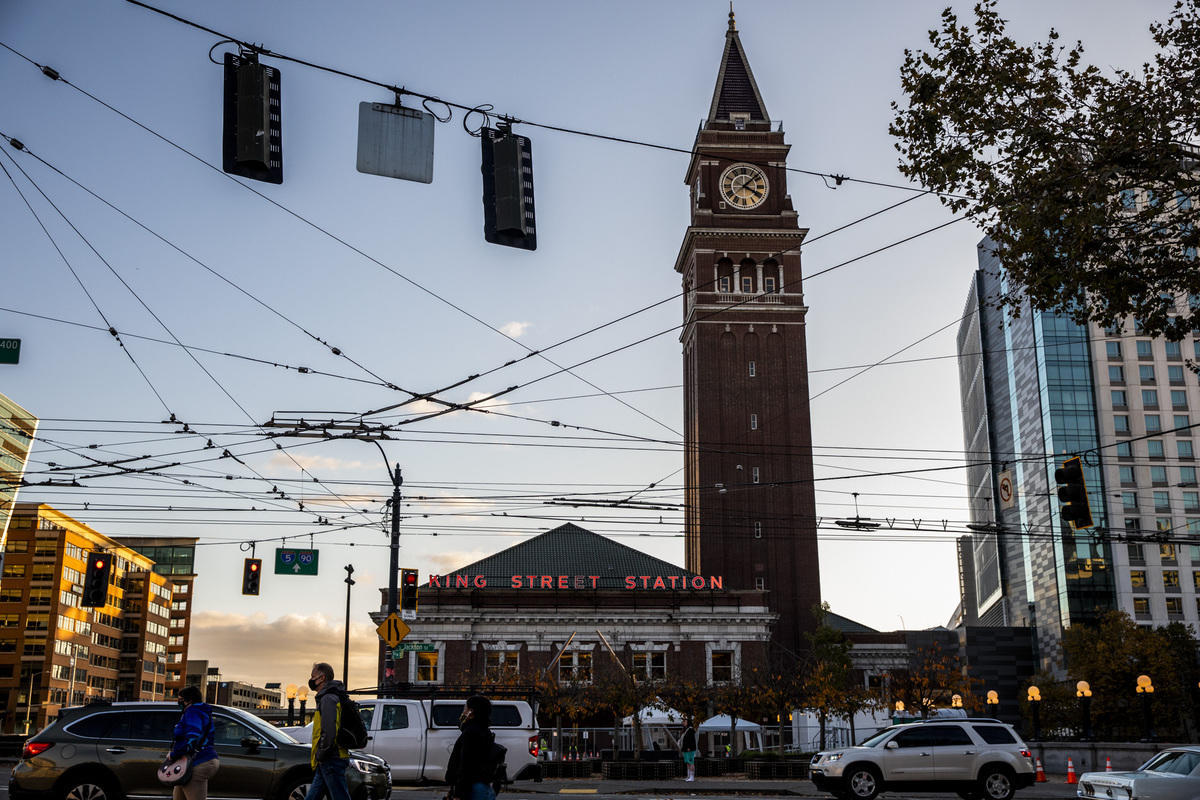
The five youth-arts organizations that occupy Station Space — RES, Totem Star, The Rhapsody Project, Jackson Street Music Program and Whipsmart — are all part of the Office of Arts and Culture’s Creative Advantage program to increase student access to the arts.
“We know that art saves lives,” said Olisa Enrico, executive director of CSA, in an interview with Crosscut. “And that starts in the most crucial point of youth.”
“Plus,” Erin Jorgensen, digital media specialist for ARTS, wrote in an email, “it’s just fun to walk in the building and hear theater vocal warm-ups or hear drum solos coming through the floorboards.”
Around 300 people attended the grand opening and ribbon-cutting event, including homegrown rapper Sir Mix-a-Lot as the keynote speaker. (Among his other remarks, he noted, “Sixty-year lease! Impressive.”) When Enrico introduced RES director Brooks, the audience cheered loudly.
“RES as an organization has embodied the survival resiliency that our Native communities are legendary for,” Brooks said during the opening. “RES has never had a theater space of our own to call home,” he said. “To say that having this new black box-style theater workshop space in the heart of Seattle is one of the most significant events in our history would be an understatement.”
Also at the opening day ceremony, RES youth performed the finale track from their original musical Dracula Spectacular. “Like an eagle soaring above, we move forward with love, always knowing the light will lead us home,” they sang.
A creative outlet for Indigenous youth
Over its three decades, RES has worked with Indigenous youth from various tribes and backgrounds, presented almost 200 productions and performed on stages at ACT Theatre, Seattle Repertory Theatre, Intiman Theatre and The 5th Avenue Theatre. They’ve also worked closely with other local Indigenous organizations such as the Daybreak Star Indian Cultural Center.
Every year RES holds an intensive two-week summer camp that culminates in a performance. In the fall and winter, it hosts workshops — acting, filmmaking, playwriting — often led by local theater artists of Native heritage. The youth also put on a big spring production that’s free to the public (as are all of RES’s performances). The students’ age range is typically 10 to 19, with about 120 kids annually.
The original stories that RES performs are rooted in the cultures of Indigenous peoples with an eye toward contemporary social relevance. Many originate from traditional stories passed down from tribal elders and others in the Native community.
Created in-house, the plays are written by people in an RES alumni program called Yesterday, Today, Tomorrow: Urban Native Performing Artists. Youth also collaborate with the playwrights and directors to create the productions.
Several of RES’s past shows have direct connections with the Pacific Northwest. In 2011, A Right to Justice (by local Native teaching artists Drew Hobson and Hannah Victoria Franklin) was a response to the police killing of John T. Williams (Nuu-chah-nulth) in Seattle the year before. The musical As Long as the Rivers Run (2013), by local writer and UW lecturer Roger Fernandes (Lower Elwha S’Klallam Tribe), focused on fishing rights and the importance of salmon to local tribes.
More recently, RES youth brought attention to the incidence of missing and murdered Indigenous women with the 2019 production MISSING, directed by local actor, director and producer Josephine Keefe (Nez Perce).
“Native people are the original artists and storytellers of this land and of this continent,” Brooks said. “Mainstream arts and theater are starting to notice that they need to catch up with what our Native communities have been doing.”
This past year, RES performed the more lighthearted play-turned-musical Dracula Spectacular by alum and staff member Dylan Elwood (Turtle Mountain Chippewa) and jazz vocalist Julia Keefe (Nez Perce). Two RES students — 14-year-old twin sisters Sophia and Olivia Vann (Cherokee Nation of Oklahoma), who performed at the opening — described it affectionately as “campy.”
“RES deserves this [space],” said Olivia Vann at the November 11 event. She and her sister are excited about the new location, and described the move as “reclaiming” and “decolonizing” Indigenous land.
